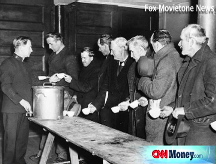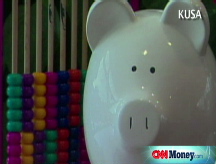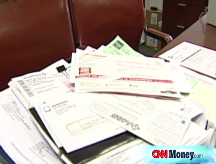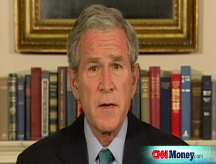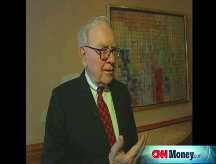Bailout fears sink stocks
Dow falls 348 as investors worry that the House won't approve the $700B plan.

NEW YORK (CNNMoney.com) -- Stocks tumbled Thursday as frozen credit markets and weak economic reports amplified jitters ahead of the House vote on the $700 billion bank rescue plan.
Credit markets remained tight, with two closely watched measures of bank lending jitters at record highs. Treasury prices jumped, lowering the corresponding yields, as investors sought less risky places to put their money.
Weekly jobless claims soared to a 7-year high, alarming investors ahead of Friday's big monthly report. And factory orders slumped to a 2-year low.
The Dow Jones industrial average (INDU) fell 348 points, recovering a bit from a drop of 391 points earlier. The Standard & Poor's 500 (SPX) index lost 4% and the Nasdaq composite (COMP) lost 4.5%.
"There's still concern about whether or not the House will pass the bill and, even if they do, whether it will be effective," said Ron Kiddoo, chief investment officer at Cozad Asset Management.
Stocks dipped Wednesday ahead of the Senate's 74-25 approval of the bill. On Thursday, the focus turned to whether the House will also pass the sweetened version. A vote on the bill is expected Friday, after the House shot down a slightly different version on Monday.
While critics say the bill won't do much to help the ailing economy, supporters say that without it, the financial market crisis will accelerate.
Billionaire investor Warren Buffett said that it is crucial to the global economy that the bailout plan passes and that $700 billion may not be enough. Buffett was speaking at Fortune's Most Powerful Women summit (Full story).
The House's rejection of the initial bill Monday sent the Dow down 777 points in its worst single-day point loss ever. Should the House fail to approve the bill Friday, it's thought it would be bad for the stock market, but disastrous for the credit markets.
Businesses depend on the credit markets to function on a daily basis, and the absence of ready capital has stalled the broader financial system and is also hurting the consumer.
"When you restrict credit, you restrict the ability of commerce to grow to its potential," said Gus Scacco, managing director of AG Asset Management.
"Banks have a limited amount of capital to dole out, so even if you are a company that is seeing decent growth, you are probably having a hard time getting a loan," he said.
The higher bank lending rates directly impact consumers too, he said, making it hard to get auto loans, or loans for a mortgage or tuition. Credit card companies are approving less people or trimming lines of credit, leaving individuals with less buying power. Consumer spending fuels two-thirds of economic growth.
Bailout: The core of the bill allows the Treasury Department to buy $700 billion in bad mortgage assets from banks, to be held and eventually sold off if and when the market improves. Ideally, with cleaner balance sheets, banks would start lending to each other again, loosening up the nearly frozen credit markets.
Modifications made after the House rejection include limiting executive pay packages at participating firms and raising the FDIC insurance cap. The FDIC insures depositors in case of a bank failure. Raising the amount it can insure could make investors and businesses less anxious to withdraw money from a struggling bank. (Full story)
The bailout was concocted in the wake of a series of bank failures and mergers that stemmed from the housing market collapse and subsequent credit crunch. Frozen credit markets mean banks cling to cash, making it difficult for businesses and individuals to get needed loans.
Credit markets: Several measures of bank nervousness hit record levels Wednesday, with banks still wary despite the prospect of the bailout gaining passage.
"What all these measures are telling us is that banks aren't willing to lend to anyone," said Kiddoo. "It shows you that the credit crunch is spreading to Main Street."
The 3-month Libor - the rate banks charge each other to borrow for three months - rose to 4.21% from 4.15% Wednesday, a more than 9-month high, according to Bloomberg.
The difference between the 3-month Libor and the Overnight Index Swaps rallied to an all-time high of 2.6%. The Libor-OIS spread measures how much cash is available for lending between banks and is used by banks to determine rates. The bigger the spread, the less cash is available.
The TED spread, which is the difference between 3-month Libor and what the Treasury pays for a 3-month loan, briefly hit an all-time high of 3.62%, before pulling back to 3.61%.
When banks are relatively confident, they charge each other rates that aren't much higher than the U.S. government. When the spread widens, that indicates increased jitters.
The yield on the 3-month Treasury bill, seen as the safest place to park money in the short term, fell to 0.68% from 0.80% late Wednesday. On Monday, the yield fell to 0.14% as panic gripped the markets. Earlier this month, the three-month bill skidded to a 68-year low around 0%. (Full story)
Long-term government debt prices rallied and the yields slipped. The benchmark 10-year Treasury note rallied 30/32, sending the corresponding yield down to 3.62% from 3.75% Wednesday. Treasury prices and yields move in opposite directions.
Company news: General Electric (GE, Fortune 500) shares slid after the company sold $12 billion in common stock Thursday at $22.25 per share, a 9% discount to Wednesday's closing price. The stock failed to benefit from late Wednesday news that Warren Buffett's Berkshire Hathaway will buy $3 billion in preferred stock. GE has been slumping lately amid worries about its earnings. (Full story)
A slew of bank and other financial services stocks dipped, including American Express (AXP, Fortune 500), Bank of America (BAC, Fortune 500), Morgan Stanley (BAC, Fortune 500) and Citigroup (C, Fortune 500).
Late Wednesday, freight-transportation company Con-Way (CNW) cut its earnings forecast for the full year, citing the difficult business environment. Shares fell 20.5% Thursday. A variety of other transportation stocks slid too, including railroads CSX (CSX, Fortune 500) and Norfolk Southern (NSC, Fortune 500).
Trucker JB Hunt (JBHT) fell 13% after a pair of analysts issued dour forecasts on the sector amid slumping manufacturing activity and the economic slowdown.
The Dow Jones transportation (DJTA) average lost 8.7%.
Fertilizer companies tumbled on Mosaic's weak profit report - and Merrill Lynch's downgrade - amid bets that the agriculture sector has peaked after surging earlier in the year.
Mosaic (MOS, Fortune 500) slumped 41% in unusually active New York Stock Exchange trade after it had reported higher earnings late Wednesday that were shy of estimates, sparking several analyst downgrades Thursday.
Monsanto (MON, Fortune 500) slid on the Merrill Lynch downgrade, losing 16.2% in active New York Stock Exchange trade. Other heavily traded losers included Potash (POT) and Agrium (AGU).
Farm equipment makers fell too, including Deere (DE, Fortune 500) and Caterpillar (CAT, Fortune 500), a Dow component.
MetLife (MET, Fortune 500), Hartford Financial Services (HIG, Fortune 500) and other life insurance companies slumped on widening credit spreads and comments from Senate Majority Leader Harry Reid, D-Nev., late Wednesday about a possible bankruptcy in the industry.
Market breadth was negative. On the New York Stock Exchange, losers topped winners five to one on volume of 1.51 billion shares. On the Nasdaq, decliners beat advancers by more than four to one on volume of 2.22 billion shares.
Economy: The number of Americans filing new claims for unemployment rose to 497,000 from a revised 496,000 the previous week, a 7-year high. Economists surveyed by Briefing.com thought claims would fall to 475,000, on average.
August factory orders fell 4% after rising 0.7% in the previous month. Economists surveyed by Briefing.com thought orders would fall 2.9%.
Oil and gold: Oil prices continued to retreat on bets that slower global growth will keep slowing demand for oil.
U.S. light crude oil for November delivery fell $4.56 per barrel to settle at $93.97 a barrel on the New York Mercantile Exchange. (Full story)
Oil prices have been rising lately, along with gold and other commodities, as investors have looked for relatively safer places to park their money amid the stock market instability. Prices initially plummeted more than $55 per barrel through early September after peaking at $147.27 per barrel on July 11.
COMEX gold for December delivery fell $43 to settle at $844.30 an ounce.
Other markets: In currency trading, the dollar gained against the euro and fell against the yen.
Gas prices fell for the 15th day in a row, according to a nationwide survey of credit card activity.
In global trading, European markets tumbled, while Asian markets ended mixed, with the Japanese Nikkei losing 1.8%
Worried about your retirement? Tell us your story ![]()

